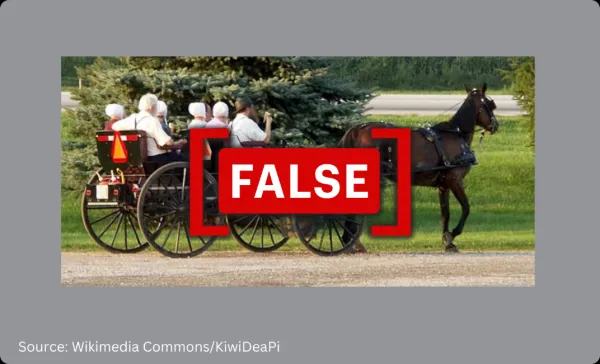By: Arron Williams
July 7 2023

The COVID-19 pandemic did affect Amish communities and evidence does not suggest that lack of vaccination resulted in lower death rates.
Context
A tweet with 151,000 views claims that “the Amish Died of COVID at a Rate 90 Times LOWER Than the Rest of America.” The post further claims that this is due to the Amish community being unvaccinated and not following CDC guidelines, stating, "Ignoring those guidelines meant a death rate 90 times lower than the rest of America.” Similar posts about Amish communities being unaffected by COVID-19 and being proof that vaccines make things worse have circulated on social media since 2021.
According to PBS, the Amish, who are predominantly located in the U.S., are a distinctive Christian subculture that traces its roots to the 16th-century Protestant Reformation. They eschew modern technology, favor plain clothes and horse-drawn transportation, and speak a Pennsylvanian German dialect.
In Fact
Amish communities were affected by COVID-19, and evidence does not suggest that lack of vaccination resulted in lower death rates.
Professor Mitchell Braxton, a genetic epidemiologist at the University of Maryland, School of Medicine, studies Amish populations, mainly the Lancaster County Amish community in Pennsylvania, the largest Amish community in the U.S.
Speaking with Logically Facts, Professor Braxton said “Even though hard numbers are not readily available, I certainly do not agree with the claim that Amish communities were largely unaffected by COVID-19 and suffered lower death rates than the rest of the U.S.” He explained, “in terms of COVID-19-related deaths, there is not a lot of hard data about this, partly because these deaths are not systematically reported.” But, through informally tracking death rates in the Lancaster community, he saw “several spikes in the number of deaths in some months corresponding with heavy COVID-19 waves.” He added that, through conversations with colleagues looking at other Amish communities, he has no reason to believe that the COVID-19 experience in the Lancaster community was different from other settlements.
“The COVID-19 pandemic certainly did impact the Lancaster Amish community,” according to Professor Braxton, adding that it is “perhaps not surprising since Amish are very family- and community-oriented.” He stated that in much of the community, social distancing was not practiced, and there was little use of face masks.
Other evidence also shows that Amish communities were hit hard by COVID-19. A CDC study in 2020 reported that “social gatherings, important in Amish communities, likely contributed to rapid transmission of SARS-CoV-2 (COVID-19) in a rural Ohio Amish community.” It found that out of 30 participants, 23 tested positive for COVID-19 and that sustained transmission was associated with multiple social gatherings.
NPR also reported on the COVID-19 impact on Amish communities in Ohio, revealing they experienced some of the state’s highest rates of infection and death. According to the article, the Amish community is skeptical of vaccines: roughly 10% of the Ohio Amish communities are fully vaccinated, and in the total U.S. Amish population, less than 1% have received any dose of vaccine. Beliefs of herd immunity, COVID-19 misinformation, and anti-vax conspiracies are also common in the Amish community.
The Verdict
The Amish community was affected by COVID-19, and suffered both infections and deaths. There is no hard evidence that suggests Amish communities suffered fewer deaths because they were unvaccinated. Therefore, we have marked this claim as false.
The COVID-19 pandemic has given rise to a lot of potentially dangerous misinformation. For reliable advice on COVID-19, including symptoms, prevention, and available treatment, please refer to the World Health Organization or your national healthcare authority.